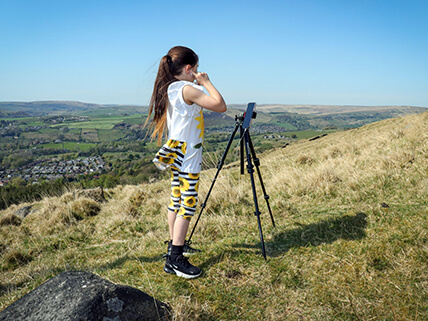
Content creator at work
Is the clock running down on TikTok? The platform is used by around 150 million Americans, and almost two-thirds of all American teenagers. U.S. Government officials, however, believe TikTok is a national security risk and a threat to the mental health of teen users. TikTok’s CEO, Shou Zi Chew, was asked to appear before the US Congress to answer questions about these concerns.
TikTok is a short-form video sharing platform whose parent company, ByteDance, is based in China. Any user can easily upload videos from their phone for other users to view and add comments. The app feeds users videos to watch based on information the app has collected about each user. Users can also follow their favorite content creators, so they get their latest videos.
The combination of short videos and simple interface helped TikTok explode over the last five years. There are about 94 million active TikTok users every month in the United States. Globally, there are about 1.8 billion active users every month. Most content creators on the platform are between 18 and 24, and the most popular creator has 141 million followers. This wild success has made TikTok one of the largest social media platforms.
Criticisms of social media companies often fall into one of two categories: security risks and harm to mental health. The current focus on TikTok’s security is because of China’s communist government. It has the power to force Chinese-owned companies—like TikTok’s parent company—to share information about their customers in the name of national security. As a result, governments around the world see the app as a possible tool for Chinese spying efforts.
Critics also argue that TikTok is actually targeting younger audiences and harming their mental health. Issues such as anxiety and depression are often associated with extended use of social media. For example, if a user watches a video on a specific topic, TikTok will suggest videos on the same topic or a similar topic. If that content is harmful, the user can quickly become overwhelmed. In addition, critics have accused TikTok of being too slow in removing content that might be considered harmful.
Utah’s state legislature recently passed a bill that will require parental consent for anyone under 18 to have a TikTok account, or any social media account. The bill also requires companies to not use any techniques that would cause a minor to become addicted to the site. It remains to be seen how the state will enforce the law.
TikTok is very popular, but that has not stopped some countries from taking action. Canada and Belgium have banned TikTok from all government-issued devices. India went further and banned the app nation-wide citing security and mental health concerns.
In the United States, the federal government is in the process of removing the app from all government devices, and it is considering a national ban. When he appeared before congress TikTok’s CEO, Shou Zi Chew, said his company was not influenced by China, was not turning over user data to the Chinese government, and was taking steps to specifically protect Americans’ information. Congressional members at the hearing were skeptical and more action seems likely.
Image credit:
©eric latham/Alamy
Sources
- Analysis: Can the U.S. government ban TikTok?
(Source: PBS; accessed April 3, 2023) - TikTok congressional hearing: CEO Shou Zi Chew grilled by US lawmakers
(Source: Reuters; accessed April 3, 2023) - Influencers take stock of life and dreams if U.S. bans TikTok
(Source: Reuters; accessed April 3, 2023) - Why does US see Chinese-owned TikTok as a security threat?
(Source: AP News; accessed April 3, 2023) - Here are the countries that have bans on TikTok
(Source: AP News; accessed April 3, 2023) - Why TikTok is being banned for some federal employees
(Source: PBS; accessed April 3, 2023) - Utah bans under-18s from using social media unless parents consent
(Source: The Guardian; accessed April 3, 2023)



